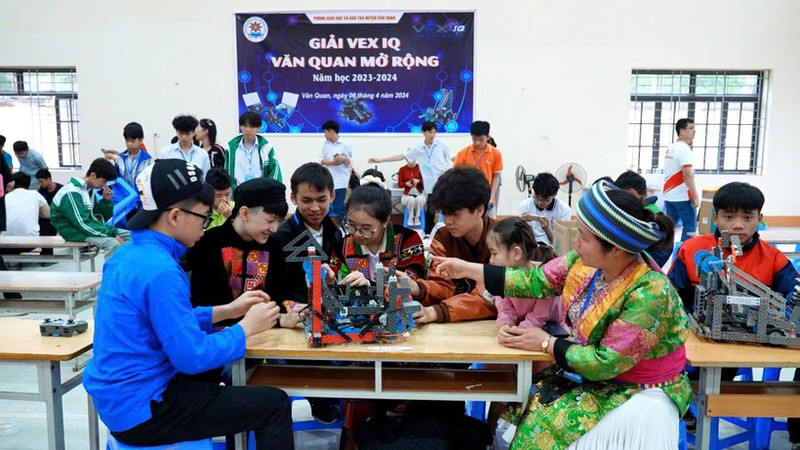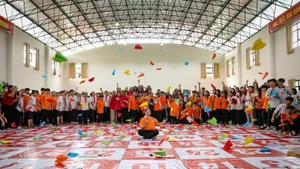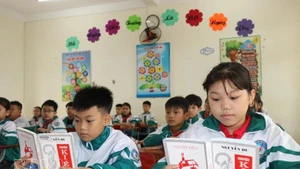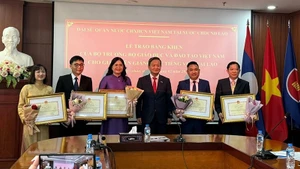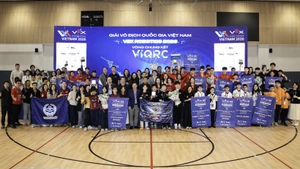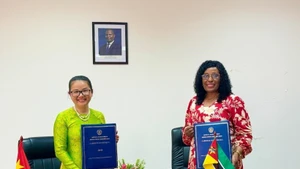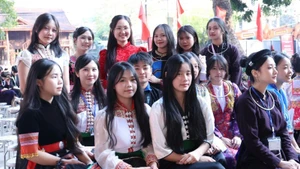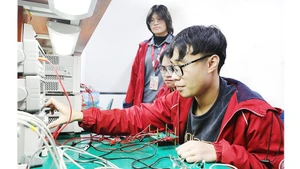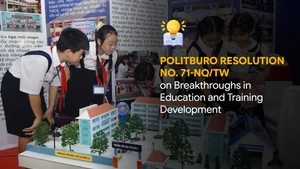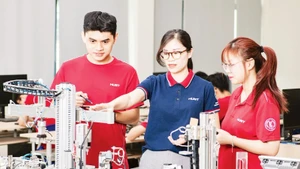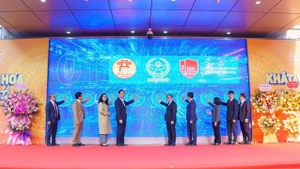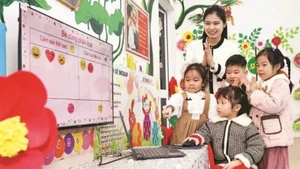Digital transformation is no longer a choice but has become a central orientation in the national education development strategy.
Pathfinders
Resolution No. 71-NQ/TW of the Politburo on breakthroughs in education and training development clearly defines the requirement that the widespread adoption and application of digital technology and artificial intelligence in education and training is one of the key and breakthrough tasks.
At the national conference on “Innovation and improvement of education and training quality in ethnic minority and mountainous areas”, Minister of Education and Training Nguyen Kim Son stated that applying information technology and digital transformation in teacher training is an important solution to shorten the quality gap between advantaged and disadvantaged regions. In mountainous areas, where conditions are still limited, digital transformation will serve as a “lever” to help teachers overcome difficulties, unlock knowledge, broaden opportunities, and nurture future generations.
In Dong Van Commune (Tuyen Quang Province), the road to school winds through steep mountain slopes, but the most challenging journey is bringing digital knowledge to highland students.
Teacher Vang Thi Dinh of Dong Van Lower and Upper Secondary Boarding School for Ethnic Minorities and her colleagues in the high mountains began their journey with aspiration and dedication. With an old laptop, the young teacher taught herself programming, robotics, and artificial intelligence through online courses provided by STEAM for Vietnam and the Alliance for the Promotion of STEM Education.
When night fell and the dormitory grew quiet, Dinh quietly worked through each line of code, built each design, and brought concepts once thought to belong only to cities back to the rocky plateau. From there, she formed the first robotics team, organised STEM Day, launched the KCbot competition, and even brought robot performances to the foot of the Lung Cu Flagpole.
Not stopping at the level of one school, she connected 20 lower secondary schools in the region, conducted robotics training, introduced AI into teaching, and expanded technological opportunities to villages and hamlets. Lessons on writing technical reports, robotic arms controlled by sensors created by her students have become symbols of a vibrant digital transformation carrying the breath of the highlands.
In Trung Khanh Commune (Cao Bang Province), teacher Dam Thi Uyen began her STEM journey with scrap materials. With a lack of adequate teaching equipment, she and her students built water filters, gas-leak warning systems, and other models using bottles, plastic scraps, and copper wires. Each simple product touched the most important goal: sparking creativity in the minds of highland children. Uyen taught herself programming, connected with support organisations, and founded a Robotics Club so students could “learn by doing”. In 2025, her robotics team won the national “Inspiration Award”, bringing pride from the borderlands to a national technology arena.
Starting from the inner strength of the teacher, Dam Thi Uyen is one of hundreds of teachers contributing to the digital transformation journey in Cao Bang, where infrastructure is limited. The provincial education sector has implemented free VEX VR virtual robotics teaching from preschool to upper secondary levels, and organised robotics competitions for both teachers and students, even in the most disadvantaged areas.
To date, more than 500 schools across the province have received STEM–Robotics training; hundreds of preschool teachers have become familiar with robot programming; 10 preschools now own VEX 123 robots; and 100% of upper secondary schools are equipped with robots. Director of Cao Bang’s Department of Education and Training Nguyen Ngoc Thu shared: “More than 80% of our students are in disadvantaged areas, so we prioritise digital transformation by bringing digital learning materials and smart classrooms into schools while improving teachers’ digital capabilities to narrow the knowledge gap.”
In La Lay, a border commune adjacent to Laos in Quang Tri Province, young teacher Hoang Duong Hoa began his first IT lesson with three old computers retrieved from storage. Some students had never seen a keyboard before and were afraid to touch the mouse. Without waiting for support or new devices, he quietly repaired the machines, connected cables, powered them on, and patiently taught his students the simplest steps: turning the computer on and off, typing their names, and drawing their first lines in Paint. Outside regular lessons, he opened free tutoring sessions, organised group work, and guided students in finding materials and practising presentation skills. His students have confidently participated in competitions such as Young Informatics, Youth Creativity, and Quang Tri Tourism Ambassadors.
Reaching the global stage
In the 2025–2026 academic year, Lang Son became the first locality with a public-school teacher achieving the EP certificate, serving as Head of the Regional Organizing Committee for the VEX IQ Robotics World Championship — an international technology competition with strict accreditation requirements. It was also the first year the province hosted the Viet Bac regional qualifying round, marking a pivotal step for mountainous-region STEM education to reach international standards. This achievement did not come from luck.
To obtain the EP certificate, teachers must undergo extensive study with rigorous examinations and training that strictly follow international procedures. They do not have abundant modern equipment, but they have determination, a spirit of learning, and strong support from leadership to teachers.
This spirit was further ignited at Lang Son’s 2025–2026 Innovation Festival with specialised seminars on AI, STEM, Resolution No. 57, robotics competitions, robotic plant-growing models and particularly 207 student start-up booths from mountainous communes. Each product and idea vividly demonstrated a generation of teachers and students not only accessing technology but mastering it, from classrooms to their communities.
For three consecutive years, students from Cao Bang Provincial Upper Secondary School for the Gifted have participated in the VEX Robotics World Championship. In 2025, the team won two major awards, including the “Community STEM Education Impact Award”. Their winning image was selected for display at the A80 National Exhibition, proving that in the nation’s northernmost region, technological aspirations are far from small.
“STEM does not begin with equipment but with the teacher — with mindset, spirit, and learning design,” emphasised Do Hoang Son from the Viet Nam STEM Alliance.
From Tuyen Quang, Cao Bang, Lang Son to Quang Tri and many other localities, today’s highland teachers are not only shining role models who remain steadfast in villages teaching literacy; they are quietly opening new pathways with knowledge and technology. They sow great aspirations from small lessons, driven by the belief that their students can step out into the world.
As teacher Vang Thi Dinh once hoped: “From generations of students who can build robots from scrap, future engineers, scientists, and tech entrepreneurs will emerge — bringing creative ‘Make in Viet Nam’ solutions to the world.” This is not just an educational outcome, but a vivid embodiment of the spirit of Resolution No. 71-NQ/TW which highlights promoting comprehensive digital transformation and the widespread adoption of technology and artificial intelligence in education and training as a central mission.
